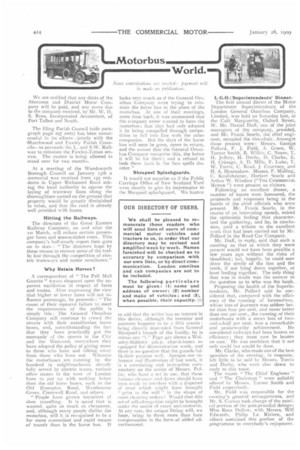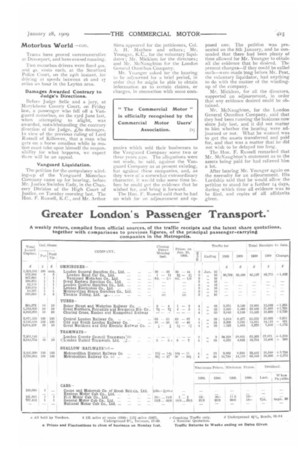Motorbus World.
Page 6

Page 7

If you've noticed an error in this article please click here to report it so we can fix it.
News contributions are invited: payment will be made on publication.
We are notified that any debts of the Aberavon and District Motor Company will be paid, and any sums due to the company received, by Mr. W. II. S. Rees, incorporated Accountant, of Port Talbot and Neath.
The Fling Parish Council (vide paragraph page 297 ante) has been unsuccessful in its efforts—jointly with the sMarchwood and Fawley Parish Councils—to persuade the L. and S.W. Railway to reinstate the Fawley-Totton service. The matter is being allowed to stand over for two months.
At a meeting of the Wandsworth Borough Council on January 13th a memorial was received from 152 residents in Upper Richmond Road asking the local authority to oppose the laying of tramway lines along the thoroughfare named on the ground that property would be greatly diminished in value, and that the road is already well provided with buses.
Hitting the Railways.
The directors of the Great Eastern Railway Company, on and after the ist March, will reduce certain passenger fares and season-ticket rates. This company's half-yearly report then goes on to state " The directors hope by these means to recover some of the traffic lost through the competition of electric tramways and motor omnibuses."
Why Retain Horses ?
A correspondent of " The Pall Mall Gazette" waxes eloquent upon the apparent vacillation in respect of fares and routes. After expressing the view that higher or lower fares will not influence patronage, he proceeds : "The .cause of their repeated failure to meet the requirements of the public is simply this : The General Omnibus Company still continue to crowd the streets with their antediluvian horse buses, and, notwithstanding the fact that they have practically got the monopoly of the streets in the City and the West-end, everywhere they have adopted the policy of giving more -to those who have and taking away from those who have not. Whereas the motorbuses are running by the hundred in neighbourhoods already fully served by electric trams, various other routes in the west of London have to put up with nothing better than the old horse buses, such as the Old Brompton Road, Westbourne Grove, Cromwell Road, arid others.
" People have grown impatient of slow travelling. It is speed that is wanted, quite as much as cheapness, and, although many people dislike the motorbus, still it is recognised to be a far more convenient and rapid means of transit than is the horse bus. It
looks very much as if the General Omnibus Company were trying to reinstate the horse bus in the place of the motorbus. At one of their meetings, some tune back, it was announced that the company never wanted to have the motorbus; that they had only adopted it by being compelled through competition to fall into line with the other companies. But the days of the horse bus will soon be gone, never to return, and the sooner that the General Omnibus Company recognise this, the better it will he for them ; and a refusal to look these facts in the face spells disaster."
Shrapnel Splashguards.
It would not surprise us if the Public Carriage Office of New Scotland Yard were shortly to give its imprimatur to the Shrapnel splashguard. We hasten
to add that the writer has no interest in this device, although the inventor and patentee happens to be a fifth cousin : being directly descended from General Shrapnel's branch of the family, he is minus one "1." Page 421 shows a Wolseley-Siddeley 3oh.p. char-k-bancs so equipped for demonstration work, and there is no question that the guards fulfil.their purpose well. Apropos our reference and illustration of last week, it is a convincing and instructive commentary on the action of Messrs. Pilllar, who have a set in use, that these famous cleaners and dyers should have been ready to interfere with a dispersal of mud which might have brought " grist to the mill " in the shape of more cleaning orders I Would that this act of self-abnegation might be brought under the notice of every anti-motorist. At any rate, the unique fitting will, we hope, bring to them more than bare compensation in the form of added advertisement.
L.G.04 Superintendents' Dinner.
The first annual dinner of the Motor Department Superintendents of the London General Omnibus Company, Limited, was held on Saturday last, at the Café Marguerite, Oxford Street, W. Mr. Daniel Duff, one of the joint managers of the company, presided, and Mr. Frank Searle, the chief engi
neer, occupied the vice-chair. Amongst those present were : Messrs. George Pollard, F. J. Field, A. Green, W. Turner Smith, R. Wilkie, C. Neave, T. H. Jeffery, H. Darby, D. Clarke, E. H. Crinage, A, D. Mills, F. Luke, T. W. Tarris, C. Read, J. Courtney, and H. A. Hearnshaw. Messrs. F. Malting, C. Krailsheimer, Herbert Searle and Arthur W. Windsor ("Tne COMMERCIAL MOTOR ") were present as visitors. •
Following an excellent dinner, a number of toasts were honoured, the proposals and responses being in the hands of the chief officials who were present. Mr. Frank Searle, in the course of an interesting speech, voiced the optimistic feeling that characterised the gathering, and he, in conclusion, paid a tribute to the excellent work that had been carried out by Mr. Pollard in the Road Car Company.
Mr. Duff, in reply, said that such a meeting as that at which they were present would not have been possible a few years ago without the risks of bloodshed ; but, happily, he could now draw the simile of the lion and the lamb, if not lying down together, at least feeding together. The only thing that was in doubt was the answer to the question as to who was the lamb..
Proposing the health of the Superintendents, Mr. Pollard said he considered that, compared with the efficiency of the running of locomotives, whose loss of journeys was seldom better than four per cent, and never better than one per cent., the running of their motorbuses with a mean loss of twoand-a-half per cent. was a remarkable and praiseworthy achievement. He considered railways had been beaten on efficiency ; they must now be beaten on cost. He was confident that it not only could hut would be done.
Mr. Clarke, who made one of the best speeches of the evening, in response, left little to be said by Messrs. Tarris and Darby, who were also down to reply to this toast.
The toasts "The Chief Engineer " and " The Chairman " were suitably offered by Messrs. Turner Smith and Field respectively.
Mr. Field was responsible for the evening's general arrangements, and Mr. S. Curzon took charge of the musi cal portion of the post-prandial doings; Miss Rosa Dallow, with Messrs. Will Edwards, Philip La Riviere, and others sustained this portion of the programme to everybody's enjoyment.
Trams have proved unremunerative at Devonport, and have ceased running.
Two motorbus drivers were fined 4os. and 4s. costs each, at the Stratford Police Court, on the 24th instant, for driving at speeds between 16 and 07 miles an hour in the Leyton area.
Damages Awarded Contrary to Judge's Directions.
Before Judge Selfe and a jury, at Marylebone County Court, on Friday last, a passenger who fell off a Vanguard motorbus, on the 23rd June last, when attempting to alight, was awarded, notwithstanding the contrary direction of the Judge, 4.60 damages. In view of the previous ruling of Lord Russell of R illowen, that a man who gets on a horse omnibus while in motion must take upon himself the responsibility for what happens, we expect there will be an appeal.
Vanguard Liquidation.
The petition for the compulsory winding-up of the Vanguard Motorbus Company came up for hearing, before Mr. Jusl ice Swinfen Eady, in the Chancery Division of the High Court of Justice, on Tuesday morning last. The Han, F. Russell, R.C., and Mr. Arthur
Sims appeared for the petitioners, Col. A. H. Mayhew and others ; Mr. Younger, K.C., for the voluntary liquidator; Mr. Micklem for the directors; and Mr. McNaughton for the London General Omnibus Company.
Mr. Younger asked for the hearing to he adjourned for a brief period, in order that he might be able to obtain information as to certain claims, or charges, in connection with some corn panics which sold their businesses to the Vanguard Company some two or three years ago. The allegations were not made, be said, against the Vanguard Company as at present existing, but against these companies, and, as they were of a somewhat extraordinary character, it would take some time before he could gct the evidence that he wished for, and bring it forward.
The Hon. F. Russell said that he had no wish for an adjournment and op posed one. The petition was presented on the 8th January, and he Contended that there had been plenty of time allowed for Mr. Younger to obtain all the evidence that he desired. The present charges-if they could be called such-were made long before Mr. Peat, the voluntary liquidator, had anything to do with the matter of the windingup of the company.
Mr. Micklem, for all the directors, supported an adjournment, in order that any evidence desired could be obtained.
Mr. McNaughton, for the London General Omnibus Company, said that they had been running the business now since July last, and it did not matter to him whether the hearing were adjourned or not. What he wanted, was to get the assets transferred and paid for, and that was a matter that he did not wish to be delayed too long.
The I-Ton. F. Russell remarked that Mr. McNaughton's statement as to the assets being paid for had relieved him a lot.
After hearing Mr. Younger again on the necessity for an adjournment, His Lordship said that he would allow the petition to stand for a further 74 days, during which lime all evidence was to be filed, and copies of all affidavits given.




















